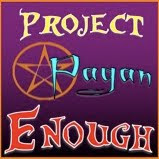I very much enjoyed Bob Patrick's recent post "Divining Divinity" over at Meadowsweet & Myrrh.
What spoke to me about this post? A whole bunch of things. Rather than go through and analyze and annotate the whole thing, I'll just pull out a few highlights:
1) "Belief" vs. "working with," or experience.
"That is a Christian presumption that other religious paths require belief as it does. What of those paths that do not require belief?"
I come face-to-face with this often, with the assumption that a dedicated religious or spiritual life of course requires belief -- and that a spiritual or religious life that is based in belief is by definition superior to one that isn't.
Recently, I was at a conference that focused on the diversity of Quaker women's theaological experience. Not our theory, not our thoughts, but our experience: narrative theology was the phrase shared with me with excitement by the conference organizers.
I was nonetheless yanked up short by how wedded some of the Christian women in particular there were to this assumption about belief.
"So, if you don't believe in Jesus, but you're here because you're Quaker, but you're telling me -- you're -- a -- Witch -- then -- that means you believe in -- well, not the Devil? -- I guess, if you're -- a member of your -- Meeting -- so -- what, exactly?"
When it was my turn: "Actually, I would say, You experience the Divine as Jesus, or through Jesus, whereas I experience It as, or through, the grass, the trees, the seasons, Nature, the other women here, animals, all life, the Earth, the Air, the Fire, the Water, the Spirit, the Goddess. It's not about belief. It's about experience. I can go outside and touch. I can touch you. I can breathe the air. I eat food."
Blank looks.
It's one thing to come across this attitude from people who operate in a particular theological tradition; but I also get it all the time from non-Pagans who are non-theists and atheists, too. What gets me is how Judeo-Christian these nonbelievers still are in their thinking and reactions, and how they still try to force other people into that same narrow box they claim to reject.
2) "Worship"
The word "worship" has a connotation of subservience rather than one of simply reverence. It definitely generates the idea that when we gather in worship, we are holding ourselves subservient to that which we worship, and holding that which we worship as superior to ourselves. As a Feminist Witch, I struggled with this when I when I first came to Quakerism; and something that I appreciated was the discussion in my then-Yearly Meeting's Faith and Practice about the roots of the word in worth-ship: what do we hold in worth, in esteem?
What's more, here's that notion again of not only the separation of divinity from creation, but also of creation at all. This is so enshrined in Judeo-Christian, and possibly all Abrahamic, thinking, that most folks simply don't recognize the assumption they're making -- much less the religious and theaological ethnocentrism in it.
This is just not my experience of the Divine.
Seeing "divinity as totally other and superior to the creation."
Sure, there are plenty of creation myths in Paganism / in different Paganisms. But if the gods and the world are not separate -- if That-Which-Is-Sacred and That-Which-Is aren't different -- creation isn't linear; it's cyclical. Personally, I may have a Mother Goddess, but I don't have a "creator." My relationship with the Earth is to someone who grew me, not someone who made me. And there's a big difference. Reverence in connection. The gods are not outside the world, separate from it: They are the world, the creator and the created.
In technical terms, we're talking about world-views of immanence and transcendence, and world-views of both.
3) That conversation!
Why can't I be that articulate all the time?
Wednesday, 18 August 2010
Subscribe to:
Post Comments (Atom)







2 comments:
Yes. Well said.
Thanks for your comment, Hystery.
Post a Comment